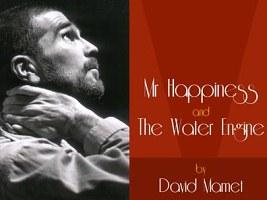Mr Happiness / The Water Engine (Double Bill)
Review by Peter Brown
18 June 2011
Two plays, originally destined for radio and written by David Mamet, form this interesting programme at the Old Vic Tunnels. The first play, 'Mr Happiness' is a monologue in which David Burt as Mr Happiness answers letters sent to him by listeners seeking advice about a wide range of issues. Sipping his whiskey between dealing with different problems, Mr Happiness sometimes tells us what the nature of the problem is that he is dealing with, and sometimes simply replies 'in confidence', just delivering his verdict.
David Burt's rich, warm voice is perfectly suited to this kind of intimate monologue, but it's also enhanced through the amplification system, so that it embodies the special quality of a radio broadcast as well. Though there's kindness and understanding in Mr Happiness, he's not reticent about rallying his listeners to make things happen for themselves - it's all about attitude, he says. But attitude alone is no match for the might of capitalism which inventor, Charles Lang, must face in the second play 'The Water Engine'.
As the title readily suggests, Lang has found a way to power an engine using water as fuel. The implications are enormous, and Lang knows he must tread carefully in getting his invention patented and subsequently to market. So, he visits an attorney to ensure that he has the power of the law on his side. However, the lawyer passes news of the invention to others, and Lang is subjected to threats and harassment to sell his invention, and when he declines to do so, his fate is sealed.
A fine ensemble cast not only provide the characterisations, but also the live music and sound effects. David Burt is in action again, this time playing a shadowy figure, Oberman, who purports to be a lawyer, but appears more sinister and rather more powerful. Jamie Treacher's Lang is cautious and sensible, but one feels he knows from the start that his ambitions for his invention will be thwarted. There's good support from Anna Maguire as Lang's sister and James Hillier as the lawyer, Gross.
Both plays were originally set in a radio studio in 1934, and director Kate McGregor has sought to marry radio with a live theatre production. The synthesis generally works very well with microphones used to pick-up and enhance the sound effects as well as the dialogue. However, interspersed with the main plot, are what seem to be advertisements for chain letters which I found intrusive and confusing.
This was my first visit to the Old Vic Tunnels which lie, almost secretively, under Waterloo station. Surprisingly, the trains moving overhead are not too intrusive, and the atmosphere lends itself perfectly to this kind of production, even if there were one or two water leaks to dodge after a torrential downpour.
David Mamet's two plays complement each other nicely. The first is concise, intimate and atmospheric and is well-contrasted with the second which takes us into the realms of industry and business, opening and widening the lens to examine the interaction of the individual in relation to society as a whole. The conclusion leaves Mr Happiness's advice more or less in tatters. How can the individual function in a society where overwhelming forces are ranged against him and where trust means nothing? It's a rather depressing message, though not really innovative or unique. Nevertheless, Kate McGregor's thoughtful and well-executed production is highly watchable and well-worth a visit.
Originally published on
